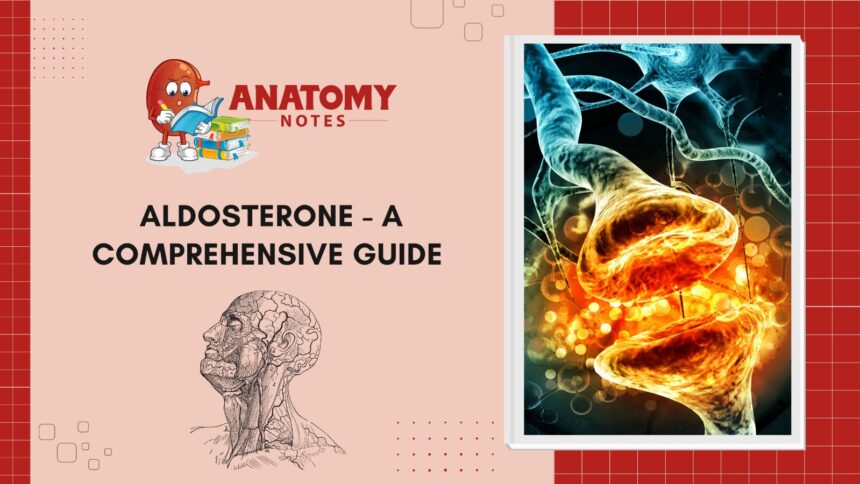Introduction to Aldosterone
Welcome to the fascinating world of aldosterone – a hormone that plays a crucial role in keeping your body in balance. From regulating blood pressure to maintaining electrolyte levels, aldosterone is like the unsung hero working behind the scenes to keep you healthy and functioning optimally. In this blog post, we will dive deep into everything you need to know about aldosterone, from its mechanisms of action to its implications for various health conditions. So buckle up and get ready for an enlightening journey through the intricate workings of this important hormone!
The Role of Aldosterone in the Body
Aldosterone, often referred to as the “salt-retaining hormone,” plays a crucial role in maintaining electrolyte balance within the body. It is primarily produced by the adrenal glands and acts on the kidneys to regulate water and salt levels. By increasing sodium reabsorption and potassium excretion in the distal tubules of the kidneys, aldosterone helps control blood pressure and fluid balance.
In addition to its role in regulating electrolytes, aldosterone also influences blood volume and vascular tone. When released in response to low blood pressure or high potassium levels, aldosterone promotes sodium retention, leading to an increase in extracellular fluid volume.
Furthermore, this hormone interacts with other systems like the renin-angiotensin-aldosterone system (RAAS) to maintain homeostasis. Aldosterone’s functions are essential for overall health and proper physiological functioning within the body.
Regulation of Aldosterone Production
Regulation of aldosterone production is a complex process that involves various factors influencing the release of this hormone by the adrenal glands. One key regulator of aldosterone secretion is the renin-angiotensin system, which responds to changes in blood pressure and electrolyte levels.
When blood pressure drops or there is a decrease in sodium levels, renin is released from the kidneys, leading to the formation of angiotensin II. Angiotensin II then stimulates the secretion of aldosterone, helping to retain sodium and water in the body.
Potassium levels also play a role in regulating aldosterone production. High potassium levels can directly stimulate the adrenal glands to release aldosterone, which promotes potassium excretion through urine.
Additionally, factors like adrenocorticotropic hormone (ACTH) and plasma volume also influence aldosterone synthesis and secretion. This intricate regulatory mechanism ensures that aldosterone levels are maintained within a narrow range to support vital physiological functions in the body.
Target Tissues and Receptors
Aldosterone, often referred to as the “salt-retaining hormone,” exerts its effects on specific target tissues in the body. These target tissues primarily include the kidneys, where aldosterone plays a crucial role in regulating sodium reabsorption and potassium excretion.
Within the kidneys, aldosterone acts on mineralocorticoid receptors located in the distal tubules and collecting ducts. By binding to these receptors, aldosterone promotes the expression of proteins involved in ion transport, leading to increased sodium retention and potassium secretion.
Apart from the kidneys, aldosterone also targets tissues such as sweat glands, salivary glands, colon, and sweat glands. Each of these tissues responds to aldosterone by adjusting their ion transport mechanisms to maintain electrolyte balance throughout the body.
Understanding how aldosterone interacts with these target tissues and receptors is essential for comprehending its role in maintaining fluid balance and blood pressure regulation within the body.
Mechanism of Action
Aldosterone, a hormone produced by the adrenal glands, exerts its effects primarily in the kidneys. The mechanism of action of aldosterone involves binding to mineralocorticoid receptors located on the cells in the distal tubules and collecting ducts of the kidney. Once bound to these receptors, aldosterone triggers a series of molecular events that lead to increased reabsorption of sodium ions and water from the urine back into the bloodstream.
This process results in an increase in blood volume and blood pressure. Aldosterone also enhances potassium and hydrogen ion secretion by the kidneys, helping to maintain electrolyte balance within the body. By regulating fluid and electrolyte levels, aldosterone plays a crucial role in maintaining normal bodily functions.
Understanding how aldosterone works at a cellular level provides insights into its significant contributions to overall health and wellbeing.
Aldosterone and Electrolyte Balance
The role of aldosterone in the body extends beyond just blood pressure regulation. One crucial function is its impact on electrolyte balance, particularly sodium and potassium levels. Aldosterone acts on the kidneys to increase sodium reabsorption while promoting potassium excretion.
This intricate process helps maintain a delicate equilibrium of these essential ions in the body. When aldosterone levels are imbalanced, it can lead to disruptions in electrolyte levels, potentially causing issues like high blood pressure or muscle weakness.
By understanding how aldosterone influences electrolyte balance, healthcare providers can better diagnose and manage conditions related to electrolyte disturbances. Monitoring aldosterone levels alongside electrolytes is vital for overall health and well-being.
Maintaining proper electrolyte balance is key for various bodily functions, ensuring that cells can function optimally and supporting overall health. Aldosterone plays a pivotal role in this regulatory mechanism, highlighting its significance beyond just blood pressure control.
Aldosterone and Blood Pressure Regulation
Aldosterone plays a crucial role in regulating blood pressure levels within the body. By acting on the kidneys, this hormone helps to control the balance of water and electrolytes, such as sodium and potassium.
When aldosterone levels are elevated, it leads to an increase in sodium reabsorption by the kidneys. This results in higher fluid retention and volume expansion, subsequently raising blood pressure.
Conversely, when aldosterone levels are low or inhibited, there is reduced reabsorption of sodium and water by the kidneys, leading to lower blood volume and decreased blood pressure.
The intricate relationship between aldosterone and blood pressure highlights how important this hormone is for maintaining cardiovascular health. Dysregulation of aldosterone can contribute to conditions like hypertension or hypotension.
Understanding how aldosterone influences blood pressure regulation is essential for comprehending various cardiovascular disorders and developing targeted treatment approaches.
Disorders Related to Aldosterone Imbalance
When it comes to aldosterone imbalance, there are a few disorders that can arise. One common condition is primary hyperaldosteronism, also known as Conn’s syndrome. This disorder results in the overproduction of aldosterone by the adrenal glands, leading to high blood pressure and low potassium levels.
On the other hand, secondary hyperaldosteronism occurs when there is an increase in aldosterone production due to factors outside of the adrenal glands, such as kidney disease or heart failure. This can also result in hypertension and electrolyte imbalances.
Hypoaldosteronism is another disorder related to aldosterone imbalance where there is a decrease in aldosterone production. This can lead to high potassium levels and low sodium levels in the blood, causing symptoms like weakness and fatigue.
Understanding these disorders related to aldosterone imbalance is crucial for proper diagnosis and treatment by healthcare professionals.
Clinical Importance and Medical Applications
Aldosterone plays a crucial role in maintaining electrolyte balance and blood pressure regulation within the body. Understanding its clinical importance and medical applications is vital for managing various health conditions effectively.
In clinical settings, aldosterone levels are often measured to assess adrenal function and diagnose disorders such as primary aldosteronism or Addison’s disease. Monitoring aldosterone levels can help healthcare providers determine the underlying causes of hypertension or electrolyte imbalances in patients.
Medical applications of aldosterone include the use of mineralocorticoid receptor antagonists to treat conditions like heart failure, edema, and resistant hypertension. These medications help block the effects of excess aldosterone, ultimately improving patient outcomes and quality of life.
Research continues to explore new ways to target the renin-angiotensin-aldosterone system for therapeutic interventions in cardiovascular diseases and kidney disorders. By understanding the clinical significance of aldosterone, healthcare professionals can better tailor treatment approaches for individual patients based on their specific needs and circumstances.
Aldosterone and Renin-Angiotensin-Aldosterone System (RAAS)
The Renin-Angiotensin-Aldosterone System (RAAS) is a complex and vital hormonal cascade in the body. It plays a crucial role in regulating blood pressure and fluid balance by controlling the production of aldosterone. When blood pressure drops or there is a decrease in blood flow to the kidneys, renin is released, triggering a series of events that ultimately lead to the synthesis and release of aldosterone from the adrenal glands.
Aldosterone then acts on the kidneys to increase sodium reabsorption while promoting potassium excretion, helping to retain water and elevate blood pressure. This intricate system ensures that our bodies maintain proper electrolyte balance and hydration levels in response to changing conditions.
Dysregulation of RAAS can lead to hypertension, heart failure, kidney disease, and other disorders. Understanding how aldosterone interacts within this system provides valuable insights for developing treatments for these conditions. Ongoing research continues to unravel the complexities of RAAS, shedding light on new therapeutic targets and interventions for managing cardiovascular health.
Research and Recent Discoveries
Exciting advancements in the field of aldosterone research have been emerging, shedding light on new discoveries and potential applications. Recent studies have delved into the intricate mechanisms underlying aldosterone’s role in various physiological processes, offering valuable insights into its effects on electrolyte balance and blood pressure regulation.
Researchers are exploring novel ways to modulate aldosterone activity to target specific disorders related to its imbalance, potentially paving the way for more personalized treatment approaches. The dynamic interplay between aldosterone and the renin-angiotensin-aldosterone system continues to be a focal point of investigation, with researchers uncovering new connections and pathways that may hold therapeutic implications.
Cutting-edge techniques such as molecular imaging and genetic profiling are being utilized to deepen our understanding of aldosterone’s functions at a cellular level. These innovative approaches provide a platform for future breakthroughs in elucidating the complex interplay between aldosterone, its receptors, and target tissues throughout the body.
Conclusion and Summary
As we wrap up our discussion on aldosterone, it’s clear that this hormone plays a crucial role in maintaining electrolyte balance and regulating blood pressure in the body. Understanding how aldosterone functions and its impact on various target tissues is essential for grasping its significance in overall health.
The intricate relationship between aldosterone and the renin-angiotensin-aldosterone system highlights the interconnectedness of different physiological processes within the body. Recent research has shed light on new discoveries regarding aldosterone’s mechanisms of action, paving the way for potential advancements in medical applications and treatment strategies.
By delving into disorders related to aldosterone imbalance, healthcare professionals can better diagnose and manage conditions such as hyperaldosteronism or hypoaldosteronism effectively. The clinical importance of aldosterone underscores its relevance in cardiovascular health and homeostasis regulation.
Aldosterone remains a fascinating subject of study with far-reaching implications for human physiology and pathology.
Frequently Asked Questions (FAQs)
Q1. Can high levels of aldosterone be harmful to the body?
Yes, excessive levels of aldosterone can lead to various health issues such as high blood pressure, fluid retention, and electrolyte imbalances.
Q2. What are some symptoms of aldosterone imbalance?
Symptoms may include fatigue, muscle weakness, frequent urination, headache, and high blood pressure.
Q3. How is aldosterone-related disorders diagnosed?
Diagnosis usually involves blood tests to measure aldosterone levels and imaging studies like CT scans or MRIs to assess the adrenal glands.
Q4. What treatment options are available for aldosterone disorders?
Treatment may involve medications like mineralocorticoid receptor antagonists or surgery in cases of adrenal tumors causing excess aldosterone production.
Remember that if you have any concerns about your health or suspect an issue related to aldosterone imbalance, it is essential to consult with a healthcare provider for proper evaluation and management. Stay informed and take care of your well-being!




